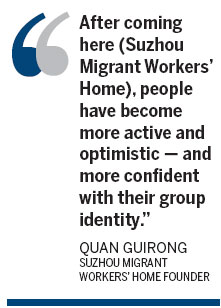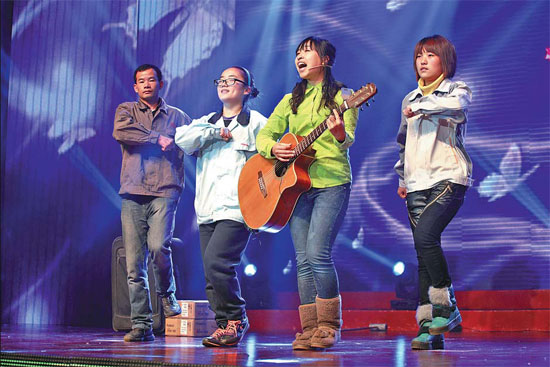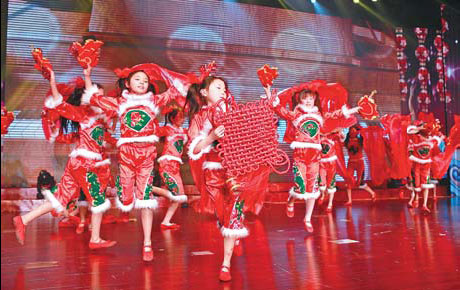The art of true grit
Updated: 2013-02-05 05:33
By Han Bingbin (China Daily)
|
||||||||
|
Duan Yu (second from right) from Suzhou Migrant Workers' Home sings at the rehearsal for the second migrant workers' Spring Festival gala. Photos provided to China Daily |
Migrant workers bring a little song, a little dance and a lot of passion to their Spring Festival gala, which has blossomed this year after a makeshift start, Han Bingbin reports.
The second migrant workers' Spring Festival gala will be broadcast nationwide via two satellite channels on the Lunar New Year's Eve. Taped in an auditorium in downtown Beijing on Jan 26, the show has soared far beyond the imagination of its initiator, Sun Heng. Sun still remembers vividly how the first event took place in total shabbiness.
In early 2012, to mark the 10th anniversary of their young migrant worker art troupe, Sun and his colleagues put together what he calls a "self-entertaining" gala show inside a crude shack in Picun, a migrant neighborhood on the far outskirts of Beijing.
The troupe, organized by Sun and a few chums who failed to fulfill their star dreams in Beijing, came together that night plainly dressed and filled the cold air with both laughter and tears - singing and acting out their frustrating realities. The sounds were occasionally drowned out by passing planes whistling by overhead.
One surprise was that China Central Television's star host Cui Yongyuan, who has won acclaim for his support of migrant workers, voluntarily hosted the show. That helped the video to become an online hit, with more than 50,000 viewers and a lot of discussion in just three days.
That was just the beginning. The troupe also sought donations to raise more than 100,000 yuan ($16,043), which has enabled them to bring migrant-worker performers from as far as Guangdong province to be a part of the show this year. Cui again hosted the show, joined by a few celebrity singers who rose to stardom from impoverished or migrant roots.
Better acoustics and fancier stage designs this time around should guarantee more publicity and impact. While reportedly insisting that they will avoid any commercial involvement, the organizers expect the now-annual show to become a cultural brand, giving voice to and helping improve the livelihood of migrant workers, whose images are sometimes played down or misrepresented.
After a performance tour to migrant communities around the country, Sun says, he has felt the workers' strong desire to express themselves.
Unlike their fathers' generation, which eyed making money as the only goal of life, Sun says these younger migrants are eager for education, interpersonal communication and, most noticeably, cultural life. In manufacturing centers like Shenzhen and Suzhou, Sun says, there are many interconnected show groups where young migrant workers play hip-pop, write songs and even shoot documentaries with the help of the Internet.
With simple forms, their art has sometimes outshined commercial products thanks to its vivid realism.

For example, during this year's gala, Duan Yu from Northeast China described the frustrations of her mobile life in her song Moving Home and expressed her longing for a steady job and home. In his song Payslip, Yan Qingjun describes how he was trapped between the anticipation of a payslip and his anguish that the payslip has restricted his life.
Both working in Suzhou, Duan and Yan are part of an active community called Suzhou Migrant Workers' Home, where their group comes together to compose songs and create stage dramas for their community of migrants. Besides performances, the home also offers a free reading rooms, various interest groups, legal consulting and - most importantly, according to its founder Quan Guirong - a chance for otherwise lonely workers to share their feelings and working experiences in a place where they feel at home.
"After coming here, people have become more active and optimistic - and more confident with their group identity," Quan says.
After traveling to a dozen cities and working a dozen jobs, Quan hit upon the idea of establishing a workers' home in 2003. He himself had craved a more fulfilling life and a sense of belonging. But a lack of funds forced him to put aside the idea until 2008, when he put together 40,000 yuan to launch a reading room in Suzhou. Later he won financial support from Oxfam that has enabled him to expand the project.
The Hong Kong-based NGO now financially supports 12 migrant-worker service institutions in major coastal provinces. According to their statistics, by founding their own art troupes and publishing magazines and music albums, these institutions have provided cultural services to more than 1 million migrant workers.
In addition to meeting growing needs for self-expression and development, these institutions help migrants integrate and find their place in the community, says Lu Meihua, Oxfam's livelihood assistance program officer.
Some of these institutions are also winning support from local governments. For example, Suzhou officials have provided the migrant workers' home there with free space. The local government has also started to buy their services, such as hiring them for community weekend film-screening events.
Some migrant workers in neighboring cities have regularly traveled to these places to enjoy the good company and a sense of home. Some frequently ask Quan to expand the services to their cities. That's why, even though private and public support has helped them toward a sustainable future, Quan still wants to "do bigger and better".
One good example might be Sun Heng's art troupe, now called the New Worker Art Troupe, which has evolved from its original base in the capital's Picun neighborhood into a complex of service institutions for migrants.
In 2005, the troupe released its first album. With the royalty income, 75,000 yuan, the group founded a school that now has nearly 500 students, all children of migrants from across the country. Now known as the Beijing workers' home, their main undertakings have included a chain store selling cheap second-hand commodities, a training center, a migrant-worker culture museum and a theater.
Just like the annual gala show, Sun says, all these efforts are designed to create a new culture of labor and call on people to respect the value of labor.
"But one institution's power is limited. We need numerous workers' homes," Sun says.
Contact the writer at hanbingbin@chinadaily.com.cn.
|
A group of migrant workers' children stages a dance. Photos provided to China Daily |
(China Daily 02/05/2013 page18)

 In Photos: 7.0-magnitude quake hits Sichuan
In Photos: 7.0-magnitude quake hits Sichuan
 Li Na on Time cover, makes influential 100 list
Li Na on Time cover, makes influential 100 list
 FBI releases photos of 2 Boston bombings suspects
FBI releases photos of 2 Boston bombings suspects
 World's wackiest hairstyles
World's wackiest hairstyles
 Sandstorms strike Northwest China
Sandstorms strike Northwest China
 Never-seen photos of Madonna on display
Never-seen photos of Madonna on display
 H7N9 outbreak linked to waterfowl migration
H7N9 outbreak linked to waterfowl migration
 Dozens feared dead in Texas plant blast
Dozens feared dead in Texas plant blast
Most Viewed
Editor's Picks

|

|

|

|

|

|
Today's Top News
Live report: 7.0-magnitude quake hits Sichuan, heavy casualties feared
Boston suspect cornered on boat
Cross-talk artist helps to spread the word
'Green' awareness levels drop in Beijing
Palace Museum spruces up
First couple on Time's list of most influential
H7N9 flu transmission studied
Trading channels 'need to broaden'
US Weekly

|

|









